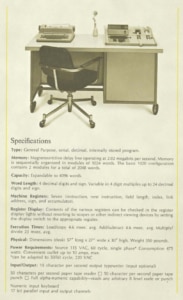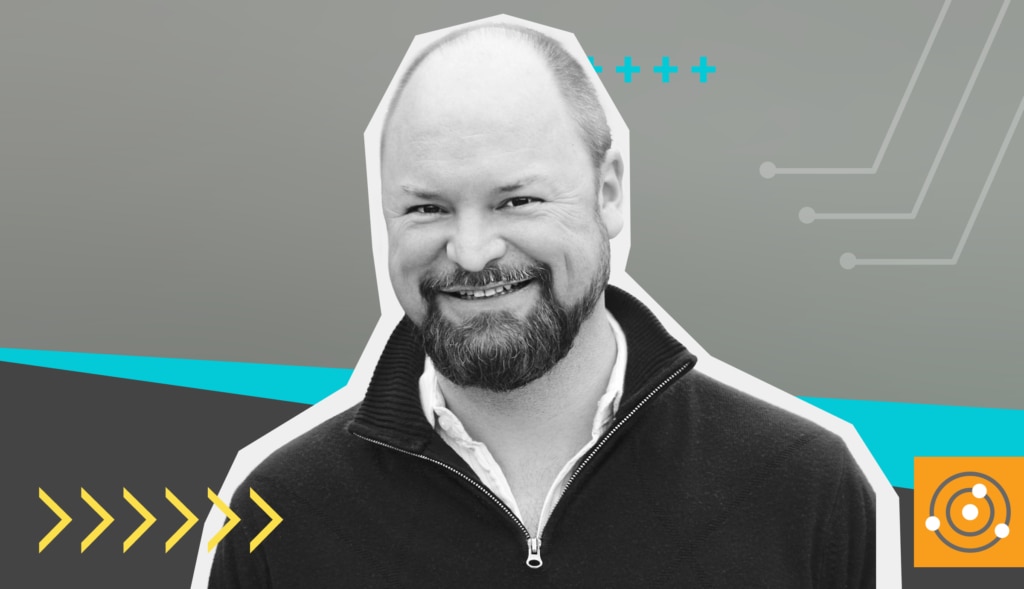Growing up in the suburbs of Seattle, WA, in the late ‘60s and early ‘70s was like most everyone else’s experiences. Dad worked as an analog computer engineer for a Boeing subcontract and Mom was a homemaker. If you visited my house back then, you would notice one big difference from other homes in middle-class America. This thing (below):

The PDS-1020, one of the earliest desk-sized computers. It had 2048 bits of RAM. Not Kb not Mb, just bits!
The Kline family had computers during a time when computers where rare even in corporate and industrial settings. From then onward, we always had a computer in the home. Naturally, growing up with a computer and parent who was computer literate in that era had a big impact on my future, but it was by no means set in stone.
Milestones
The first version of this blog post went into detail about my life experiences and how I came to this point in my career. However, because I’m old and wordy, it got really long. So instead of the <verbose> blah blah blah </verbose> version. I thought I’d do as much condensing as possible while still providing a lot of information.
Milestone 1 – College
Work hard and focus. As IT people, many of us are naturally ADD. In fact, most of us need that characteristic to be successful because we have important information and people reaching out to us across a multitude of channels. Context switching is a crucial skill in our business. But college taught me an important lesson about project level work that I have used repeatedly—
it’s better to do one or two things with excellence than it is to do a dozen things with mediocrity. Part of this lesson was learning the more projects you start, the less likely it is for any one of them to successfully complete. It seems counter-intuitive but
do less to accomplish more.
Milestone 2 – NASA and the DoD
My first couple jobs as a data professional were interesting, challenging, and terrifying. When you’re sitting across the conference table from the PhD scientists who figured out a major NASA challenge and has a multitude of patents to their name, the imposter syndrome is
REAL. I spent this time primarily as a database developer, documentation writer, and junior data scientist. I learned two important lessons at this stage of my career. First,
having a mentor who can aid with technical questions and inter-office politics has a major impact on your career trajectory. Second, construct a mindset in which you
see the worlds as an endless series of interlocking systems, rather than as discrete people, places, and things. Everything interacts. When you’re troubleshooting a major technology problem like a memory issue, knowing the way memory management works in your database is much more valuable than knowing you have an error message about memory. Everything from standing in line at the grocery store to first meeting a potential business partner gets better with this mindset.
Milestone 3 – Big 4
After time honing my technical skills as a software developer at NASA and the DoD, I moved to Nashville, TN, to work in the IT center of one of the Big 4 accounting firms with brilliant people for whom I still hold in the highest regard and with deep affection. During this time, I moved from database development into database administration and enterprise architecture, began to write regularly, and worked with several others to found the Professional Association for SQL Server (PASS). At this stage I learned major life lessons about working with others. Here’s one I’ll pass along: mastery at technical skills get you the new job you want, but
mastery of interpersonal skills get you the promotion you want. Many IT people adhere to the myth that you’re either naturally “good with people” or you’re not. Not true—you can and should learn these skills.
Milestone 4 –Database Tools Vendors
After working with database teams and enterprise data estates of the largest scale, I learned one thing was certain: tooling for data and database professionals has long trailed that of software development professionals. After working as a DBA for years, I wanted to help make tools for DBAs like me who wanted to work smarter and not harder. After all, if I give a tools vendor $20 but receive in return $100 of value, my next question is not “Why did I spend this $20?” My next question would be “How much value will I get if I spend $100?!?” One of my biggest lessons learned in this phase of life is “
The perfect is the enemy of the good (enough).” What I’m basically saying is most data professionals are detail-driven to the point of near-paralysis. But at the end of the day, you and your organization need to be productive. In the software industry, a new concept has arisen called Minimum Viable Product (MVP). In other words, what are the minimum features a product needs for prospects to buy it? The lesson of MVP (i.e. good enough for a positive outcome) is applicable to many of life’s challenges, because many of life’s challenges need a solution
now. You’ll never get a solution now (or even next week) if the solution must be perfect.
Present Day: SolarWinds Head Geek
Joining SolarWinds as a Head Geek is a real thrill for me. I love working for a company whose products make the lives of our customers better. And I love working with people who are smart, passionate, and motivate, like my peers on the Head Geek team. So, thank you to my new colleagues for giving me a warm welcome! I look forward to years of new lessons learned and new friendships formed. And, of course, I look forward to building the best possible data and database tools for you, our customers. Cheers!




